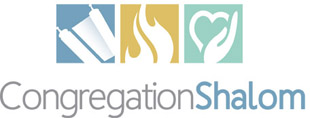Return from Sabbatical
Keeping Connected April 2024
Dear Friends,
It has been a hectic two weeks since being back in the country. First let me say how touched I was to see the welcome on my door in the synagogue. The “Keeping Me in the Loop” was a wonderful project and I so enjoyed reading all the links on the chain. It also made me smile to see the welcome back poster from the students in the school. I am deeply grateful to everyone who helped support our community while I was away, Sandy, Bonnie and Liz in the office, Rob, Lynne, Valarie, Norman, and Ari for helping to lead services, Becky Abrams, and the board of trustees and especially Deborah who carried much of the responsibilities. I feel blessed to be a part of a congregation who supports the importance of renewal for their clergy and I hope that I will be able to share some of what I learned with all of you. In particular, while I was on sabbatical and posting on Facebook and Instagram, it was wonderful to feel connected to my Congregation Shalom community.
In recent days, while catching up with people, the first question I am asked is “How was it????” It is hard to get my head around that question. I am not sure it is possible to synthesize the seven weeks of my sabbatical. I would start by saying that the whole experience was meaningful, complicated, enriching, provocative, sad, happy, diverse, and more! Obviously each of the “stages” of my trip were unique and because they were so varied and emotional, especially my time in Israel, it is hard to articulate a quick response. I am still absorbing some of what I experienced and learned. I hope to put together a spring program about my experiences in Portugal, Spain, and Prague to share some photos and insights. Please keep a look-out for information.
My trip in Israel seems so long ago at this point. I was in Israel from January 27th to February 4th, which feels like a lifetime ago. As you know from reading and listening to the news, much has evolved in the two months since I was there. Just in the last week the Supreme Court has ruled that the government cannot continue to fund Orthodox yeshivot if the students are not willing to serve in the IDF. This will likely cause huge shifts in the political world of the Israeli government. Each week, bigger and bigger demonstrations have been taking place, led by the families of hostages and those wanting change in the political leadership of the country. Clearly the world is also waiting to see if the renewed hostage release and cease-fire conversations will bear fruit. Someone at Shabbat services this past week asked if I would be willing to facilitate another conversation about what is happening in Israel and Gaza, as I did after the terrorist attack on October 7. If this is something you would be interested in please rsvp to rabbiassistant@congregationshalom.org. I want to gauge the level of interest before I schedule something.
Finally, people in our community were very generous before I left and sent money for me to donate to organizations in Israel. I wanted to share with you the places where the money was given.
- Beit Hagefen: a non-profit Arab-Jewish cultural center in Haifa that promotes dialogue and co-existence programs.
- To the Shamir Hospital whose pioneering work with hyperbaric chambers is at the cutting edge for treatment of PTSD both for soldiers and civilians.
- Congregation Shirat Hayam, let by Rabbi Miriam Klimova. Rabbi Klimova is from Ukraine and leads a new Reform congregation near Haifa. The community includes new olim from Ukraine, Russia, Belarus, often mixed families. Many of the members of this community are refugees from Odessa and traumatized by the Ukrainian war.
- Congregation Shaar HaNegev, led by Rabbi Yael Vurgan. Shaar HaNegev is a regional Reform synagogue in the region that was attacked on October 7th. It is made up of 10 kibbutzim and 1 moshav. Between two of the synagogues in this congregational community, Kfar Aza and Nachal Oz, had 79 people murdered. Almost all of the people have been relocated to other kibbutzim in Israel and the Shaar HaNegev congregation is trying to support these members and help them to cope with significant trauma.
- Reform congregation In Modi’in. Rabbi David Azouli, who grew up ultra-Orthodox, helps to serve the congregation in Modi’in and works as an army coordinator for funerals for soldiers. He is the first non-Orthodox rabbi to be allowed to officiate at military funerals. This was important in the aftermath of the attack when many of the families did not want Orthodox funerals. He uses donations to help support the congregation as well as some of the families who have lost loved ones.
- Israeli Religious Action Center – a branch of MARAM, the Reform movement in Israel. IRAC has been the lead in some of the most important cases before the Israeli Supreme court including cases about the rights of progressive Jewish in Israel: marriage, divorce, burial, conversion, prayer privileges, support of synagogues and more. They have also helped to lead some of the cases defending women’s rights, especially with the surging power of the ultra-Orthodox in the public sphere. They also address issues of LGBTQ+ rights, racism, divorce and more. They have also helped to galvanize the demonstrations last spring and summer in regard to saving the independence of the judicial system.
I look forward to seeing you in the days ahead and wish you and your family a joy-filled Pesach season.
L’shalom,
Rabbi Shoshana M. Perry
